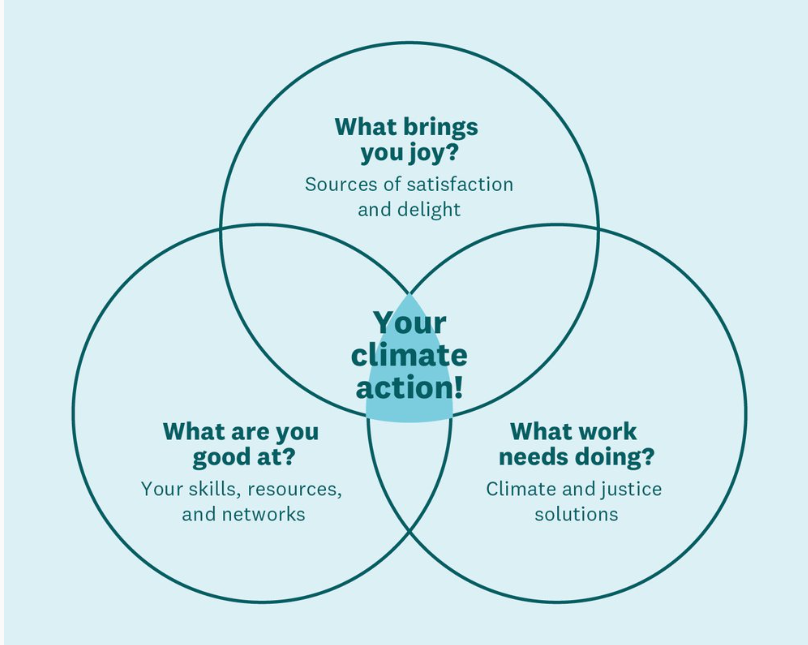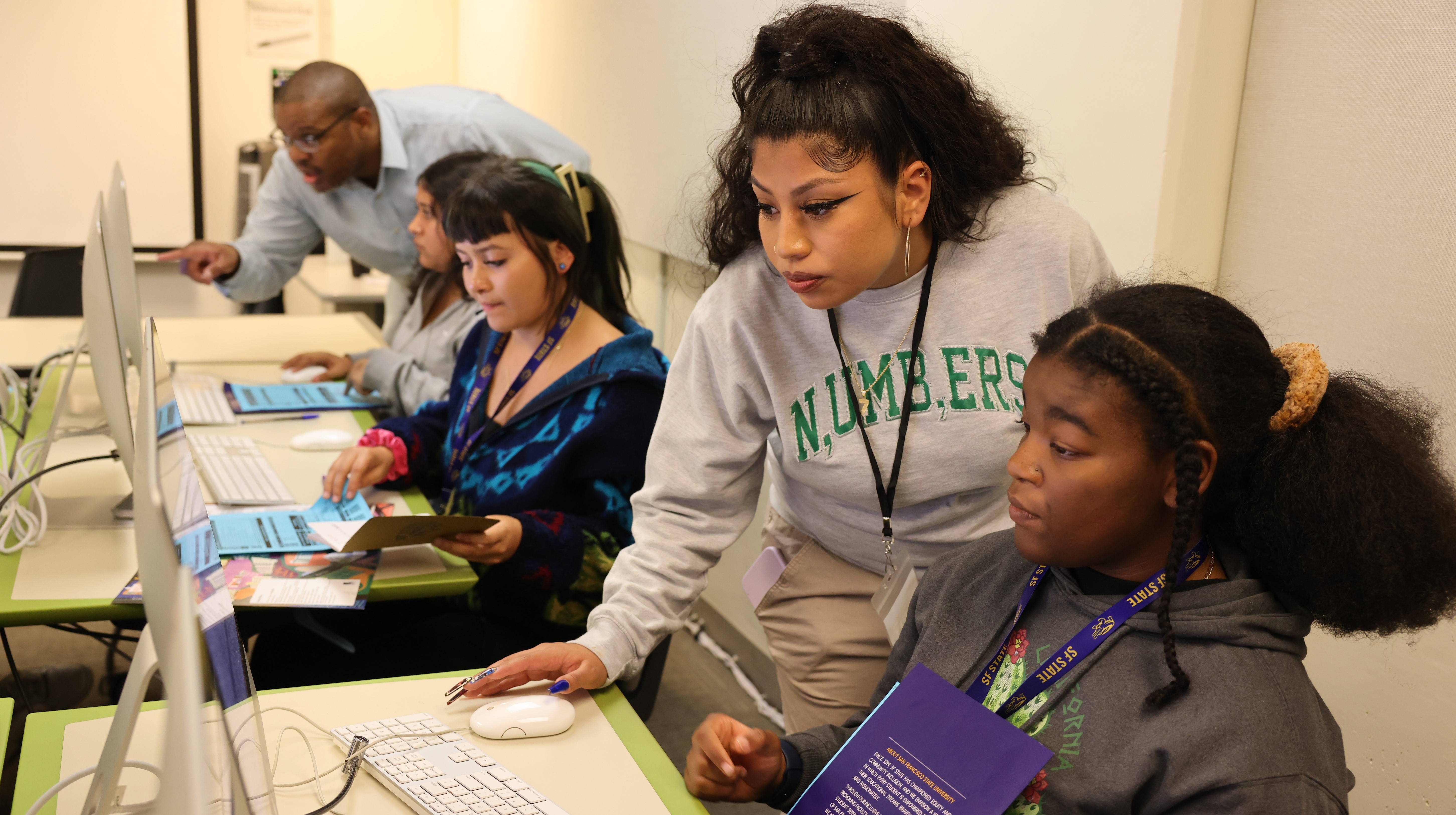How to Get a Climate Career
- Start a BA/BS from SF State in the major of your choice - all majors can be sustainability majors!
- Take sustainability and climate courses - check out our Climate Change Certificate.
- While you are earning your degree at SF State, look for internships, research opportunities, or volunteer experiences in a climate field -- whether that is with our university, with the local government like SF Environment, an environmental nonprofit, or an organization that has nothing to do with sustainability but you work to implement climate-friendly practices.
- Apply to a job!
Read on to find out how to find and get your perfect climate career.
Every Career is a Climate Career
Your career doesn't have to be directly liked to climate change or sustainability to be a climate career. Any career can be a climate career! How can you do this?
First, find out how you – specifically you – can help with climate solutions in your career with the Climate Action Venn Diagram!
Ask yourself:
- What am I good at? Think about your skills, resources, and networks. What are your areas of expertise? Who and what do you have access to? What can you bring to the table?
- What is the work that needs doing? Think about system-level change. Are there particular climate and justice solutions that interest you? Maybe starting a composting program, protecting forests, or getting climate candidates elected? Heaps of options.
- What brings me joy and satisfaction? What gets you out of bed in the morning? Don’t pick things that make you miserable and will burn you out! This is the long haul – find things that enliven and energize you.
This 10 ten-minute TED Talk by Dr. Ayana Elizabeth Johnson explores the Climate Action Venn Diagram.

Types of Climate Careers
Climate Career Organizations
It's important to know how you what to make an impact by choosing which type of organization you want to work for. No matter where you are in your career, you can always shift out of one area to another.
- “Changing the Rules”: Policy & Community
- Working for federal, state or local governments
- Working for nonprofits or community organizations
- “Changing Minds”: Education Careers
- Working for schools or nonprofits, journalism, research
- “Changing the Game”: Business Careers
- Working on sustainability for companies, firms, start-ups, etc. (either direct employee or in consulting)
- Working for mission-driven businesses in renewable energy, sustainable food systems, etc.
Categories from A Career Guide to Jobs in Sustainability.
Climate Career Fields
Any major you chose from SF State will prepare for your climate career! We need climate orientated Here are some ideas:
- Architecture: Specialize in green building practices to reduce energy needs, increase green energy production and plan for easy access to food or other resources.
- Business: Allocate funds to support sustainability, encourage divestment from fossil fuels, perform market research on increasing consumer trends towards sustainable products or change procurement policies to sustainable brands and companies.
- Data Science: Data scientists and analysts are needed for many sustainability-oriented tech companies and organizations.
- Design: Integrate environmental topics into your design, such as using sustainable materials and encouraging sustainable habits.
- Engineering: Civil - design and construction of sustainable infrastructure; Mechanical - innovating energy-efficient machinery and systems; Electrical - development and implementation of renewable energy sources; Computer/Software - design, build and maintain hardware or software for green technologies.
- Education: Incorporate sustainability topics and climate change into your teaching.
- Environmental Studies: With your specific knowledge in environmentalism, you can work in nearly all climate related fields including natural resources management, environment consulting, policy creation, sustainability coordination and more.
- Film: Create films that educate and inspire others to care about climate change and take action.
- Foreign Language: Linguists can translate sustainability research into other languages so researchers around the world can share and build upon the latest knowledge.
- Geography: Enabling the study of sustainability from a transdisciplinary perspective of humans and their environment.
- Journalism: Report on the creative sustainability solutions being implemented or normalize sustainable behaviors through your writing.
- Law: Specialize in environmental law and fight for environmental and social protections.
- Medical: Integrate environmental stewardship, social equity and fiduciary responsibility to support healthy, equitable and resilient environments and communities over time.
- Sciences: Biology, chemistry, physics and environmental science can all be used to research climate-related topics and develop new green technologies and solutions.
- Social Sciences: Psychology, sociology and anthropology can be used to change human behavior to address climate change.
- Tourism: Promote responsible tourism by getting people out in nature and teaching them to respect and cherish our planet.
- Urban Planning: Create and implement plans for the development of urban areas that promotes public amenities such as transportation, housing, and parks.
To Find Your Career, Ask Yourself:
- What type of organization do I want to work for?
- What is my current or interested major?
- When I combine these two, what types of careers does that lead to?
Example: I want to "change the rules" and I am majoring in urban planning. When I graduate, I want to find a career as a transportation specialist working for the local government to implement better public transportation in my city that reaches more people and has zero greenhouse gas emissions.
How Can I Make Sure I’m on the Right Track for My Future Career?
- Talk to professors, professionals and/or our Career Advisors to discover what opportunities exist and think about different ideas to transform our current systems and way of life.
- Shadow professionals to give you a quick look at a job. This usually lasts anywhere from a few hours to a couple days and is a great strategy to quickly experience a wide number of different careers and see what excites you.
- Intern in a position that interests you. Working in the field for a few months will give you insight on what the day-to-day work is like.
Climate Job Titles
What are some examples of job titles in a climate career? Here are just a few examples of titles to look out for:
- Agricultural Inspector
- Biologist or Chemist
- Compliance Manager
- Conservation Scientist
- Construction and Building Inspector
- Construction Carpenter
- Data Scientist/Analyst
- Energy Broker
- Environment Consultant
- Environmental Lawyer
- Environmental Protection Technician
- Environmental Specialist
- Farm Manager
- Fashion Designer
- Film Maker
- Financial Analyst
- Fish and Game Warden
- Geophysical Engineer
- Graphic Designer
- Green Marketer
- Hazardous Materials Workers
- Industrial Production Manager
- Journalist/Author/Writer
- Natural Sciences Manager
- Power Plant Operator
- Recycling/Zero Waste Coordinator
- Refuse Materials Collector
- Researcher/Technician
- Securities and Commodities Trader
- Solar Panel Technician
- Solar/Wind Energy Systems Engineer
- Teacher/Professor
- Transportation Manager
- Urban Planner
Read more about these careers here and here.
For fun, check out 50 Careers in Trees.

Volunteer Opportunities
Volunteering is a great way to gain experience. It helps you find what climate field is the best for you while also giving back to your community.
Many departments at SF State would love to have you volunteer. Here are a few examples:
- Climate HQ - climate education on campus
- Health Promotion & Wellness - health education on campus
- Sierra Nevada Field Campus - our campus in the Sierra Nevada
- The Association of Women in Water, Energy and Environment - free membership for students
Don't see your department on the list? Reach out to one of your professors and ask about volunteer opportunities!
SF State and the California Academy of Sciences have collaborated to form the California Volunteer Network, a new program designed to inspire and support nature-based volunteerism and connectivity among California's college student communities and conservation groups.
How to Apply for a Climate Internship or Job
- Write the best resume and cover letter.
- HERE is an example resume highlighting sustainability.
- Perfect your interview skills.
- Build connections and network.
- Attend career fairs and events.
- Use job search browsers when you're ready to look for a job.
- See section below!
Check out Career & Leadership Development for more resources!
Finding a Job
Internships while at SF State
- Use your Handshake account through SF State to look for internships while you are earning your degree!
Join a Corps
- AmeriCorps (U.S.)
- American Climate Corps (U.S.)
- California Conservation Corps (California)
- Sustainability Service Corps (California)
Find a Government Career
- City of San Francisco Jobs
- San Francisco Environment Jobs
- California Local Government Jobs
- California State Jobs
- Federal Job Board
- U.S. Environmental Protection Agency Careers
Search Climate and Sustainability Career Boards
- AASHE Job Board
- Brown Girl Green Job Board
- Climatebase
- Climate Wayfinding
- Conservation Job Board
- Environmental Defense Fund
- Environmentaljobs.com
- Green Jobs Network
- Idealist.org
- Occupation Wild
- Together Bay Area
- Typical career search site searches like LinkedIn, Indeed, etc., can be filtered with keywords including “sustainability”, "climate", "environmental", or “green”.
Already in a Career?
You can take action at your current job, no matter what it is, to make your company more sustainable!
Climate Solution at Work is a how-to guide for employees looking to make every job a climate job and is a great example on how you can do this. Excerpt from Climate Solution at Work (page 6):
Inside most companies, only a handful of people with “sustainability” roles consider climate issues part of their workday. But in this most all-encompassing challenge in human history, every job must be a climate job. Asking your employer for any type of change—from new coffee makers to comprehensive action on climate—can be intimidating, especially when the request targets something core and systemic to the business, and may not be supported by leadership. But there are tangible, collaborative ways to harness your employee influence and spark climate action at any company. Bottom line: All action is valuable, and the climate crisis calls on every person to find their inroad.
- Form groups with like-minded colleagues focused on creative brainstorming, identifying company leverage points, and instigating collective action. Whether through “green teams,” employee resource groups, or under-the-radar organizing, employees can pull from a variety of teams and skills, promote active participation, and set priorities and goals.
- Conduct power mapping with colleagues to identify networks inside (and outside) your company that can be tapped for change. When considering requests to company leadership, these types of mapping exercises can help you understand where influence sits in your company. Rather than bringing a request to the most powerful decision maker, this process helps identify a more accessible staff member with the right type of leadership influence.
- Join action-oriented groups like Climate Changemakers, Terra.do, or ClimateAction.tech (for those in the tech industry) to share resources and build community.
- Learn the latest about global climate solutions and explore ways to work climate into your own job responsibilities.
Download the full guide to learn more.
